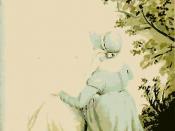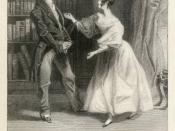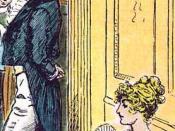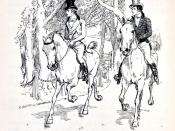How does Austen present the relationship between Darcy and Elizabeth?Awareness of social status is a central theme of the novel. The ÃÂpride and prejudiceÃÂ of both Darcy and Lizzy, and the strong-willed stubbornness of their characters make them an unlikely match. However, Austen begins to show how, despite ÃÂthe inferiority of her connectionsÃÂ; LizzyÃÂs superior intellectuality makes her an ideal companion for Darcy.
Austen portrays LizzyÃÂs supercilious nature through her response to Mr. DarcyÃÂs request for a dance. On approaching Lizzy, Darcy asks her to ÃÂseizeÃÂ the opportunity of dancing a reelÃÂ, to which she replies that she ÃÂknow[s]ÃÂ the spiteful motive behind his innocent offer ÃÂ ÃÂthat he might have the pleasure of despising [her] tasteÃÂ. Her complete confidence and self assurance in her own intellectuality here, gives the assumption an arrogant and proud tone. She continues: ÃÂI always delight in overthrowing thoseÃÂ schemes, and cheating a person of their premeditated contempt.ÃÂ
Here we can see her pompous and prejudiced attitude towards Darcy; she believes that she ÃÂunderstand[s]ÃÂ him ÃÂperfectlyÃÂ; the irony is that we as the reader know DarcyÃÂs request to be genuine.
Her use of the verb ÃÂI always delight inÃÂ ÃÂ gives her reply an extremely arrogant air, as if she is so intellectually superior that the process of seeing through DarcyÃÂs request is like a game to her. On the other hand the word ÃÂoverthrowingÃÂ shows that she is taking this intellectual battle quite seriously. There is a subtle irony however in her accusation. She sees his offer as ÃÂpremeditated contemptÃÂ when in fact it is her who is prejudging the situation. Also, Lizzy believes she has beaten Darcy by ÃÂoverthrowingÃÂ his plan but the fact that her conceited, almost childish prejudgment is completely wrong and fairly unprovoked, gives Darcy a subtle victory and makes the reader begin to have some sympathy for Darcy. The unfairness of LizzyÃÂs assumption alters the readerÃÂs allegiance between the two characters.
By contrasting Miss BingleyÃÂs childish, somewhat desperate attempts to attract DarcyÃÂs attention with the reserved, subtly flirtatious temperament of Elizabeth, Austen shows how Lizzy is more suited for Darcy than his rather shallow admirer. We are told how Miss Bingley is more ÃÂengaged in watching Mr. DarcyÃÂs progress through his book, as in reading her ownÃÂ which she had only chosen because it was the second volume of hisÃÂ. Her attempts to emulate DarcyÃÂs behaviour seem rather sycophantic or even childish and this emphasizes the important fact that although she is on the same social level as Darcy, intellectually she is far below him. The irony here is that, although Lizzy is socially inferior to them; she is far intellectually superior to Miss Bingley and on an equal level to Mr. Darcy.
Despite her unfair accusations and rather arrogant attitude towards Darcy, we can clearly see that he has a definite admiration for LizzyÃÂs strong-minded nature. He ÃÂhad never been so bewitched by any woman as he was by herÃÂ and yet he feel a ÃÂdanger of paying Elizabeth too much attentionÃÂ; he ÃÂreally believe[s]ÃÂ that if she was not so socially inferior, ÃÂhe should be in some dangerÃÂ. The repeated use of the word ÃÂdangerÃÂ shows how his pride is still strong enough for him to be worried about the effect she might have on his social status. It could also show how he, being a intellectually superior character of the novel himself, recognises her sharp-mindedness and feels intimidated or even threatened by the presence of someone on a similar level to himself.
To conclude, instead of offending Darcy, LizzyÃÂs extreme self-confidence and unjustified rudeness somehow attracts him and her intellectual qualities are emphasized by the contrast between her and DarcyÃÂs other choice: the ÃÂcold civilityÃÂ of Miss Bingley. However, he is still proud and feels that openly admiring Elizabeth could put his social standing in considerable ÃÂdangerÃÂ.
Bibliography:Pride and Prejudice By Jane Austen





